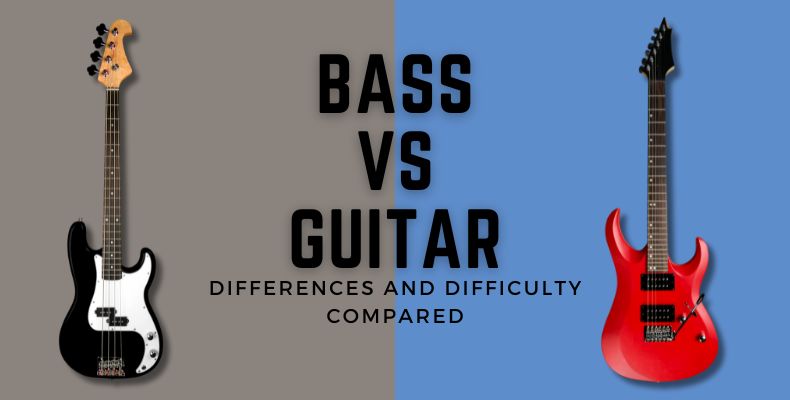Bass vs Guitar: Differences And Difficulty Compared

So you want to be a bass player or guitarist and need help deciding which one to go for.
Either instrument is a great choice. They belong to the same family and share some similarities. They also have some key differences.
KEY TAKEAWAYS
The better choice for you will be the one that matches closest to your interests and goals when it comes to music.
I play both regularly in sessions in my recording studio, and both are vital tools for my job as a composer and producer. They both serve a different yet important purpose in my productions. I’m excited to share my insights in this article.
Bass vs Guitar
One of the main distinctions between bass and guitar is their physical attributes. Bass guitars usually have four strings, while most guitars have six. The neck on a bass guitar is longer, and the frets are wider than on an electric guitar source.
In terms of sound, the bass plays a crucial role in setting the foundation and rhythm of a song, whereas guitars excel at providing melody and harmony.
As a beginner, understanding the unique characteristics of each instrument will help you decide which would suit you best. You can’t go wrong with either bass or guitar, but choosing the one that aligns with your passion and style is essential.
Main Differences
Scale Length and String Spacing
One of the main differences between bass and guitar is their scale length. A bass generally has a larger scale length than a regular guitar, resulting in a longer neck and wider string spacing. As you play, your fingers must stretch farther apart on a bass than on a standard guitar. A longer neck also allows for more frets and lower-pitched sounds.
Strings and Tuning
Bass guitars typically have fewer strings, usually four, than the six on a standard guitar. Bass strings are also thicker and heavier. The standard tuning for bass is E-A-D-G, whereas a guitar is tuned E-A-D-G-B-E. The E-A-D-G tuning of a bass is one octave lower than a guitar’s bottom four strings, giving the bass its distinct low-pitched sound.
Tones and Frequencies
Another key difference between bass and guitar lies in their tones and frequencies. The thicker strings and lower tuning of a bass yield deeper, low-pitched sounds, while a standard guitar produces different tones across a higher pitch range. This distinction in pitches and frequencies contributes to each instrument’s unique role within a musical context.
Playing Style and Techniques
Bass and guitar require different playing styles and techniques. You typically use your index and middle fingers or a pick on a bass guitar to pluck the strings.
A guitar allows for techniques such as fingerstyle, strumming, and picking with a pick. The thickness of the strings and the string spacing on the bass may take some time to get used to if you’re accustomed to playing a standard guitar.
Changing bass guitar strings generally works the same as changing guitar strings. However, the string thickness makes it a little more difficult for the first time.
One thing worth noting for left-handed players – many manufacturers make left-handed versions of their popular guitar and bass models. The playing techniques are the same for both left and right-handed players, but lefties just do everything in a mirror image when reading tabs or copying a right-handed player’s technique.
Roles in Music
Both bass and guitar are among the most common instruments in modern music, but they serve different roles.
Bass typically lays the foundation by providing rhythm, harmony, and low-pitched sounds, while the guitar contributes chords, melodies, and solos. Your choice of instrument may depend on your desired role within a band or your musical preferences.
Types and Parts of Bass and Guitar
Both instruments have a variety of parts in common, such as the body, neck, headstock, and tuning pegs.
Acoustic Bass and Acoustic Guitar
Acoustic bass and acoustic guitar are both instruments that rely on the resonance of a hollow body to amplify their sound.
Acoustic bass guitars typically use thicker steel strings to produce lower-frequency tones. As a guitar player, you may encounter classical and acoustic guitars; classical guitars use nylon strings, while acoustic guitars use steel strings.
Electric Bass and Electric Guitar
Electric bass and electric guitar are designed to be played through amplifiers and often incorporate effects pedals for shaping their sounds. The electric versions of these instruments, pioneered by innovators like Leo Fender, feature unique components like pickups and electronics for tone control.
Unique Components
Bass and guitar share some common parts but have distinct components that set them apart. Guitar pickups focus on capturing a wider range of tonal qualities, while bass pickups are tailored for the instrument’s lower frequencies.
Different Roles
The role of bass and guitar players in a band can also vary greatly. A lead guitarist typically takes on a more prominent role, often delivering memorable solos and riffs in a song. Bass guitarists often play a more foundational role, providing rhythmic support and helping to establish the song’s overall feel.
In terms of music genres, both instruments can be found in various styles of music, from rock and jazz to reggae and classical. Certain genres may emphasize one, such as funk and R&B for bass players or blues and country for guitar players.
As a musician, you’ll find that both instruments offer different challenges and opportunities for personal expression, making each a versatile instrument in its own right.
Choosing Between Bass and Guitar

Personal Preference
When choosing between bass and guitar, your preference plays a significant role. Consider the type of music you enjoy listening to and the role you envision yourself playing.
Bass might be better if you’re fond of supporting roles since it generally has a lower frequency and fewer melody lines. On the other hand, if you’re interested in playing lead lines, the guitar could be your ideal instrument.
Physical Considerations
Your physical attributes can influence your choice between bass and guitar. Guitars can be more comfortable to play for people with smaller hands due to their shorter necks and smaller fret spacing.
While bass guitars are available with shorter scales, the average size of the bass often demands larger hand stretches.
Those with smaller hands might find playing the guitar more accessible, but don’t let physical limitations deter you from pursuing your preferred instrument. Many accomplished bass players like Victor Wooten have smaller hands and adapted their techniques accordingly.
Musical Genre
The musical genre you want to play can help determine if bass or guitar is better for you. Different styles of music have varied demands on instruments.
Rock bands typically require powerful guitar riffs, while in jazz music, the double bass often plays critical roles with walking bass lines.
It’s essential to consider the genre that most inspires you and examine the typical bass and guitar roles within that style.
Bands and Collaboration
Consider your goals in playing music with others. Bass players can sometimes be in higher demand than guitarists due to fewer people choosing the bass as their first instrument.
If you want to form or join a band, playing bass might make it easier to find opportunities. However, if you prefer to perform solo or in smaller groups, the guitar could be more versatile, allowing you to play rhythm and melody lines.
When choosing whether to learn bass or guitar, you should carefully weigh personal preferences, physical attributes, musical genre, and goals when playing in a band. Remember that the most important thing is your dedication to learning and improving, whichever instrument you choose.
Notable Bassists and Guitarists
Influential Bass Players
As you explore and study bass players, you’ll find that many have left an indelible mark on music history. Some of the most notable bassists include:
- Geddy Lee is the lead vocalist and bassist of the legendary rock band Rush. Known for his unique playing style, Geddy Lee has played a vital role in shaping the sound of progressive rock. His intricate bass lines and powerful vocals have elevated him to a bass icon.
- Another influential bass player is Jaco Pastorius, widely regarded as one of the greatest bassists ever. Jaco’s groundbreaking technique and innovative use of harmonics and chords on the electric bass opened up new possibilities for the instrument. His work with artists such as Weather Report, Joni Mitchell, and Pat Metheny showcased his ability to adapt to various musical styles, which has inspired countless bass players to explore their own musical journeys.
Iconic Guitar Players
While exploring different guitarists, numerous musicians stand out in their own distinctive ways. These musicians often possess a unique sound, technique, or style that has elevated them above others in the music world.
Some noteworthy guitarists include:
- Jimi Hendrix: Widely considered one of the most influential guitarists in the history of rock music, Hendrix’s innovative use of distortion, wah-wah pedal, and other effects changed how people approached playing the guitar. His legendary performances during the late 1960s, such as Woodstock and Monterey Pop, had an everlasting impact on fans and fellow musicians.
- Eric Clapton: Known as “Slowhand,” this iconic guitarist has achieved an illustrious career spanning multiple decades and styles. From his work with The Yardbirds, Cream, and Derek and the Dominos to his impressive solo career, Clapton’s skillful playing and emotional depth make him a favorite among guitar enthusiasts.
- Stevie Ray Vaughan: As a master of blues guitar, Stevie Ray Vaughan’s musicianship and passion for his craft continue to inspire the following generations of guitar players. His blistering solos and soulful playing had the power to captivate audiences and secure his place as one of the all-time greats.
These influential musicians and their iconic performances can inspire your own musical journey. Take note of their techniques, adaptability, and the various musical styles they explored during their careers, as it might help you to unlock your own unique sound.
Exploring Different Styles and Techniques
Bass Playing Styles
You’ll quickly discover that the bass guitar is a great instrument for exploring different styles and techniques. In many music genres, the bass plays a crucial role in creating the foundation of the rhythm and harmonic structure. For instance, in rock bands and jazz ensembles, the bass is responsible for outlining the chord progression and locking in with the drums to solidify the groove.
Different bass playing styles include:

Fingerstyle
Using your fingers to pluck the strings, which is common in rock, pop, and soul music.

Slap Bass
A technique that involves slapping the strings with the thumb and plucking with the index or middle finger, popularized by funk and R&B genres.

Picking
Utilizing a plectrum or pick to play the strings, often used in punk, metal, and country music.
Experimenting with these various techniques on your bass will enhance your musical skills and improve your adaptability across different styles of music.
Guitar Playing Styles
The guitar covers an even broader spectrum of music genres and roles in a band setting. Ranging from rhythm to lead, the guitar can create textures and melodies that blend or contrast with other instruments. Whether you’re interested in folk, rock, metal, or just about any other genre, there is undoubtedly a guitar-playing style that resonates with your passion.
Some popular guitar-playing styles are:

Strumming
A technique where you use a pick or fingers to brush across multiple strings, typically for playing chords in most styles of music.

Fingerpicking
A method of playing the guitar by plucking the strings with the fingertips, often used in folk, classical, and fingerstyle genres.

Flatpicking
A style that involves playing single-note melodies with a pick, common in bluegrass and country music.

Finger Tapping
Guitar finger tapping is a technique where the fretting hand taps the strings to produce notes, creating a rapid, melodic, and percussive sound, often used in solos and shredding.
By exploring these playing styles and techniques, you can broaden your musical horizons and ultimately discover your unique voice as a guitarist in various music genres.
Frequently Asked Questions
Is bass or guitar more challenging to learn?
The difficulty of learning bass or guitar depends on individual preferences and skills. Some people might find the bass more challenging due to its thicker strings and larger size, while others might struggle with the guitar’s complex chords and fingerpicking techniques.
Ultimately, the challenge of learning either instrument can be overcome with dedication and practice.
What are the main differences between bass and guitar?
Bass and guitar have several differences, including their size, number of strings, tuning, and roles in music. Bass guitars usually have four strings, while standard guitars have six. The bass is also larger, requiring a different playing technique.
While the guitar often serves as a melodic instrument in a band, the bass covers the low-frequency range, providing rhythm and harmony.
Is it easier to play bass than guitar?
Ease of playing depends on personal preferences and learning styles. Some people find it easier to start with bass because it has fewer strings and simpler chords than the guitar. However, the bass does require greater finger strength to handle its thicker strings.
Ultimately, the easiest instrument to play is the one you’re most passionate about learning.
Which should I learn first: bass or guitar?
There is no “right” answer to this question; it depends on your preferences and musical goals. If you’re drawn to the rhythm and low-end support of bass, you might prefer starting with that. If you’re more interested in the melody and versatility of a six-string guitar, then opt for the guitar.
Keep in mind that skills learned on one instrument can be transferable to the other.
How does an acoustic bass guitar compare to other types?
An acoustic bass guitar is a bass that has a hollow body and uses an acoustic soundhole to project its sound, in contrast to the solid body and electrical amplification of an electric bass.
Acoustic bass guitars have a warmer, more natural sound and can be ideal for those who want to practice in a quieter setting or play acoustic performances.
What are the unique benefits of playing bass guitar?
Playing bass guitar offers several unique benefits. As a bassist, you’ll be the backbone of the rhythm section in a band, providing the harmonic foundation needed to support the music.
This role requires close collaboration with the drummer, allowing you to play a crucial part in maintaining the groove and flow of a song. Additionally, playing bass can improve your musical ear and harmonic knowledge, making you a well-rounded musician.
Conclusion
The choice between bass and guitar is personal. Only you will know which instrument aligns with your drive and passion for music. They’re both great instruments but with very different sounds.
When making your choice, take into account your musical preferences, physical attributes, and the role you want to play in a band.
Both instruments offer unique challenges and rewards, with the bass laying a piece’s rhythmic and harmonic foundation and the guitar often leading with melody and harmony.
The key is to choose the instrument that resonates with you the most and to enjoy the process of honing your skills and finding your unique musical voice.





